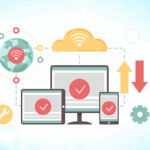Custom vs Template: Which Website Development Services Are Right for You?
October 27, 2025 | 0 Comments
business@elyriasoft.com |
+1-469-772-0531
 USA
USA IN
IN
 SG
SG
 PT
PT
Recently, cloud native app development has obtained massive admiration across different industries. Advanced features such as enhanced scalability, improved reliability, and robust security have significantly increased its demand in the development market. Organizations across industries are now implementing cloud application development services. They use these services to build and scale their new and existing applications. In this blog, we will learn how cloud app development is transforming established practices.
Cloud native app development is used to build software that is especially designed for cloud infrastructure. Cloud native apps are highly preferred by many businesses across industries. They are known and required for their flexibility and scalability. Moreover, cloud based application development has enabled organizations to build customizable apps. These systems allow them to easily scale up and scale down the resources based on their needs. People often get confused between cloud native and cloud based application development. They share some similarities but are distinct from one another. You can check out our blog to know the difference between these two by visiting the given URL: Cloud-Native vs Cloud-based: Choosing the Right Strategy for Scalable App Development.
The core principle of cloud native development lies in delivering scalable and reliable apps. With its key components, they offer enhanced customizable and deliver greater quality. By leveraging its foundational elements, i.e., microservices architecture, containerization, orchestration, and CI/CD, it builds robust systems. These principles enable teams to deliver frequent updates. They also help teams easily adapt to changing cloud environments.
Below, we have briefly described each major cloud component:
This design breaks down the app into small and independent services. Each service is assigned to resolve a particular problem. This allows the team to develop and deploy each service independently. If any changes are needed in between, they can be easily done without affecting other components.
Containerization refers to the process of packing the source code, libraries, and files into a self-contained unit called a container. Then they can be executed anywhere, regardless of the host operating system and hardware. Moreover, they are portable and maintain consistency across environments.
Kubernetes orchestration is essential for automating the deployment, scaling, and managing the containers.
Continuous integration (CI) helps developers store the frequently changed code into a shared repository for easy access. This process speeds up the development process by allowing team members to identify and fix the bugs in early stages. It automatically runs tests and measures the code quality, allowing the team to deploy features faster. Whereas continuous delivery (CD) automatically gets the code ready to be released. Continuous deployment sends the code updates straight to the users without extra manual steps. Hence, resulting in quicker and well-performing application delivery. The automation tools used in CI/CD reduce the overall risk associated with each change.
The growing popularity of cloud based solutions has significantly increased its demand. Hence, many companies are now offering cloud based development services. A few most commonly offered cloud application development services are:
To plan the development of the new cloud-based app, you will need to consider many key factors. You will have to identify your business needs, define and prioritise operational and technical specifications. Afterwards, you need to design the UX/UI and estimate the budget. Being new to the platform, it’s difficult to handle all these alone. This is where cloud consultants help you define all these requirements. They assist your business in every stage of the cloud development process. Moreover, they not only help you choose the appropriate cloud model but also select the strategy that matches your business goals and objectives.
These services include building customized applications for your mobile as well as systems. With the required skill and expertise, cloud app developers deliver the best fit for your requirements. Moreover, this service includes everything from creating a design to final production release.
These services include designing, configuring, monitoring, and managing cloud application architecture. Cloud experts help you design your app architecture from the very first step. They ensure the app does not face any security or performance issues. Moreover, from servers and networking to storage devices, they manage everything.
Migrating your legacy systems to modern cloud solutions requires a careful cloud migration strategy and the right approach. This ensures accurate data is being transferred in the migration process. Moreover, the right cloud migration strategy ensures the app meets the highest security measures. Many cloud development providers offer cloud migration solutions. They help you move your existing data securely to a new platform. From robust security to continuous support, development experts handle everything for you.
SaaS development services typically handle the entire lifecycle. It covers everything from early-stage concept development, strategic planning, interface design, to development and rigorous testing. Moreover, companies utilise advanced technologies to improve the performance of their SaaS platforms. Technologies such as AI, ML, blockchain, and IoT are used to extend the functionality and efficiency.
Trustworthy cloud maintenance and support services are essential for multiple reasons. They maintain the ongoing security, stability, and performance of cloud applications. Most providers provide an umbrella approach that encompasses the following:
Based on the research and analysis, several businesses have reported significant growth and productivity with less budget by leveraging cloud solutions. Here we have listed a few major benefits of using cloud application development services:
Integrating cloud solutions allows businesses to efficiently expand their resources based on their current requirements. For example, if you want to expand your website’s or app’s capability to handle users in some specific events. It could be during sales or festivals, then you can easily do so via cloud solutions.
Allowing businesses to make changes whenever needed not only increases scalability but also flexibility. They enhance the overall product quality. Moreover, businesses can easily add on extra resources when required. They can make certain changes, resulting in better quality and enhanced satisfaction.
Using cloud solutions not only improves the software quality but also flexibility. This leads to minimizing the overall cost spent on physical infrastructure. However, the cloud provides several development models where you only pay for the services you use.
Cloud providers spend a lot on advanced encryption techniques and regular data backups. They spend so much on access controls so they can protect the app from unauthorized access and cyber threats. Moreover, cloud experts closely monitor the whole process and respond to any security issues.
Cloud app development refers to the process of developing applications that run on cloud platforms. They can be accessed by everyone; all they need is a good internet connection.
It enables businesses to release products faster and easily scale their requirements. Utilising resources only when needed leads to efficient resource optimization. This not only saves costs but also helps them quickly meet market trends.
Cloud-native app development utilises on-demand services to build the app. These apps are easily accessed by anyone; all you need is an internet connection. On the other hand, traditional app uses on-premises hardware to build the software.
Microservices divide applications into small and independent services. They can be developed, deployed, and scaled separately. It allows teams to update features without affecting the whole system and update only the services that need more resources.
Containers pack the app code, libraries, and other essential libraries together into a unit. They can be executed anywhere. They make it more portable and make it consistent across different cloud platforms.
Through CI/CD and infrastructure-as-code, the cloud speeds up the whole development and testing process. They eliminate human errors and help teams deliver reliable updates faster.
Yes, because it allows automatic scaling and efficient resource use, reducing infrastructure waste. There are several cloud models that help you only pay for the resources you use. This eliminates the huge operational cost.
Recent Posts

Custom vs Template: Which Website Development Services Are Right for You?
October 27, 2025 | 0 Comments

From Concept to Launch: How SaaS Application Development Services Build Scalable Products
October 24, 2025 | 0 Comments

Agentic AI: The Rise of Autonomous Decision-Makers in a Human-Centric World
October 17, 2025 | 0 Comments

Empowering Growth: Cutting-Edge SaaS Application Development Solutions
September 22, 2025 | 0 Comments

Step into Web Design & Development: Creative Solutions That Elevate Your Presence
September 22, 2025 | 0 Comments

Supercharge Your eCommerce: Innovative Mobile App Development Solutions
September 17, 2025 | 0 Comments
Categories

We will zealously try to help you by providing technical support. We are open to inquiries or requests.
business@elyriasoft.com
1910 Pacific Ave, Suite 2000 #2026, Dallas, TX 75201, US.
We are available for a friendly chat to discuss your business needs, no obligation.